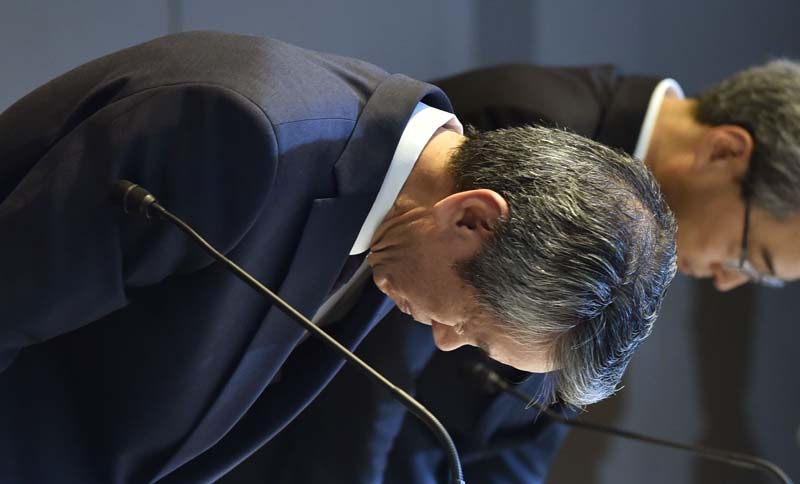Toshiba president, top executives, quit over $1.2 bn scandal
TOKYO: The president of Toshiba and seven other executives resigned Tuesday over a $1.2 billion accounting scandal blamed on their overzealous pursuit of profit that has battered one of Japan's best-known firms.
Hisao Tanaka and vice chairman Norio Sasaki -- also a former president -- were the most senior to step down after an independent report found top management complicit in a years-long scheme to pad profits.
In a stinging indictment, the report by a company-hired panel said managers were involved in "systematically" inflating profits over several years, in one of the most damaging accounting scandals to hit Japan in recent years.
"There has been inappropriate accounting going on for a long time, and we deeply apologise for causing this serious trouble for shareholders and other stakeholders," said a company statement.
At a packed press briefing, Tanaka offered a "heartfelt apology" as he bowed deeply in a show of contrition.
"This is the worst damage for our brand in its 140-year history," he said.
But the 64-year-old company veteran denied ordering staff to doctor Toshiba's books.
"I didn't order inappropriate accounting," he said.
Sasaki, 66, served as Toshiba president between June 2009 and June 2013, covering most of the period during which profits were inflated. He did not appear before the media on Tuesday.
Chairman Masashi Muromachi is taking over as interim president.
The embarrassing findings come less than two months after Japan adopted a long-awaited corporate governance code aimed at improving firms' transparency.
- 'Damage credibility' -
They will also deal another blow to corporate Japan's image after a huge scandal at camera and medical equipment maker Olympus.
In 2013 a trio of former executives at that firm got suspended jail terms for their roles in a $1.7 billion accounting fraud.
That story grabbed international headlines as its first foreign executive exposed the cover-up that led to his colleagues' downfall.
Toshiba's accounting scandal began when securities regulators uncovered problems as they probed its balance sheet earlier this year.
The Toshiba panel, headed by a former Tokyo prosecutor, described a corporate culture where underlings could not challenge powerful bosses who were intent on boosting profits at almost any cost.
"Inappropriate accounting was systematically carried out as a result of management decisions... betraying the trust of many stakeholders," it said.
"Toshiba had a corporate culture in which management decisions could not be challenged."
The panel said: "In some cases top management and division leaders appeared to have shared a common objective to inflate profits."
The findings drew a rebuke from Japan's Finance Minister Taro Aso, who warned that it "could damage the credibility of the Japanese market".
However it was unclear whether any of the Toshiba executives who stood down would face charges.
And despite the storm Toshiba shares jumped Tuesday, as the report ended months of uncertainty about the extent of the accounting problems and who was to blame.
The Tokyo-listed shares soared 6.13 percent to 399.90 yen.
The rally came after they had lost more than 20 percent since May when Toshiba yanked its earnings estimates for the past fiscal year -- a 120 billion yen ($960 million) net profit on sales of 6.7 trillion yen.
The scandal risked further fallout, including lawsuits, but was unlikely to bring one of Japan corporate giants to its knees, said SMBC Nikko analyst Yutaka Ban.
"While the profit downgrade isn't a small amount of money, it should not significantly harm the company's credit strength," Ban said.
The panel's report means Toshiba will have to restate its profits by 151.8 billion yen for the period between April 2008 and March 2014.
It is unclear whether it will affect the fiscal year ending March 2015.
Best known for its televisions and electronics, including the world's first laptop personal computer and DVD player, Toshiba has more than 200,000 employees globally and also operates in power transmission and medical equipment.






